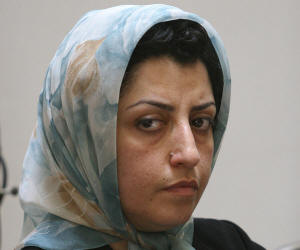Concerns grow for imprisoned Nobel Peace Prize laureate Narges
Mohammadi's health in Iran
 Send a link to a friend
Send a link to a friend
[November 19, 2024]
By JON GAMBRELL
DUBAI, United Arab Emirates (AP) — Imprisoned Nobel Peace Prize laureate
Narges Mohammadi underwent a complex surgery in Iran that saw part of a
bone in her right leg removed over cancer fears but was immediately
returned to prison, raising the risks to her life, rights groups warned.
A letter signed by over 40 activist groups, sent to the United Nations
Human Rights Council, urged that Mohammadi be immediately released on a
medical furlough from a prison sentence on charges long criticized
internationally. It is part of a wider pressure campaign on Iran over
Mohammadi's detention since the Nobel committee honored her last year.
Meanwhile, a group says another activist set himself on fire in prison
this past weekend to protest against his incarceration as Iran continues
to face internal dissent after years of protests against its theocracy.
“We urge that Iranian authorities stop the criminalization of human
rights, and refrain from summoning human rights defenders, journalists
and writers to serve their prison sentences while their health situation
is precarious,” said the letter, dated Monday.
Iran's mission to the United Nations did not immediately respond to a
request for comment Tuesday. Iranian state media, which broadly ignored
previous campaigns seeking to free Mohammadi, did not immediately report
on the letter.
Mohammadi, 52, is serving sentences totaling 13 years and nine months in
prison on charges of collusion against state security and propaganda
against Iran's government. She has kept up her activism despite numerous
arrests by Iranian authorities and spending years behind bars. That
includes backing the nationwide, women-led protests sparked by the 2022
death of Mahsa Amini.
She suffered multiple heart attacks while imprisoned before undergoing
emergency surgery in 2022, the letter says. In November of this year,
her lawyer announced that doctors found a bone lesion that they feared
could be cancerous, sparking the surgery she underwent on Thursday.
[to top of second column]
|

Prominent Iranian human rights activist Narges Mohammadi attends a
meeting on women's rights in Tehran, Iran, on Aug. 27, 2007. (AP
Photo/Vahid Salemi, File)
“She was transferred back to prison after only two days, against her
doctor’s advice and another request from her legal team that she be
granted a medical furlough and sentence suspension,” the letter
said.
“Years of imprisonment and months of solitary confinement have
severely compromised Mohammadi’s health, leaving her with multiple
serious conditions that cannot be addressed through a short,
incomplete hospital visit.”
Iran’s economy has been in tatters for years because of sanctions
imposed by the West. Its people are angry over the devaluation of
their money and government corruption. That's fueled protests, as
well as a government crackdown on dissent in the country. The return
of President-elect Donald Trump to the White House this January has
stoked concerns for some that he may resume his “maximum pressure”
campaign on the Islamic Republic.
Concerns are rising for other imprisoned activists in Iran as well.
On Saturday, Saeid Gharibi set himself on fire to protest his
15-year sentence and conditions at Shiraz's Adelabad Prison, the New
York-based Center for Human Rights in Iran said. The center quoted
his lawyer as saying Gharibi suffered severe burns to his back and
hands and has been denied medical care. Iran has not acknowledged
the incident.
Last week, a former journalist with the Voice of America’s Farsi
service jumped to his death from a building in Tehran in protest of
the country’s supreme leader and an ongoing crackdown on dissent.
All contents © copyright 2024 Associated Press. All rights reserved |